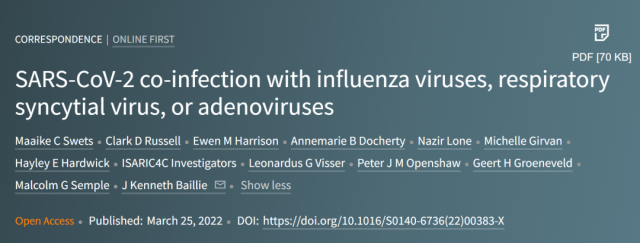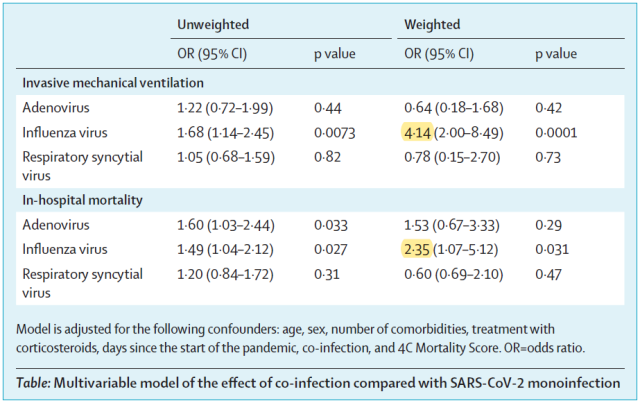Simultaneous infection with COVID-19 and influenza increases the risk of severe illness and death
- Normal Liver Cells Found to Promote Cancer Metastasis to the Liver
- Nearly 80% Complete Remission: Breakthrough in ADC Anti-Tumor Treatment
- Vaccination Against Common Diseases May Prevent Dementia!
- New Alzheimer’s Disease (AD) Diagnosis and Staging Criteria
- Breakthrough in Alzheimer’s Disease: New Nasal Spray Halts Cognitive Decline by Targeting Toxic Protein
- Can the Tap Water at the Paris Olympics be Drunk Directly?
Simultaneous infection with COVID-19 and influenza increases the risk of severe illness and death
- Should China be held legally responsible for the US’s $18 trillion COVID losses?
- CT Radiation Exposure Linked to Blood Cancer in Children and Adolescents
- FDA has mandated a top-level black box warning for all marketed CAR-T therapies
- Can people with high blood pressure eat peanuts?
- What is the difference between dopamine and dobutamine?
- How long can the patient live after heart stent surgery?
The Lancet: Simultaneous infection with COVID-19 and influenza increases the risk of severe illness and death.
On March 25, 2022, researchers from the University of Edinburgh, University of Liverpool, Leiden University and Imperial College London published research pager in The Lancet : SARS-CoV-2 co-infection with influenza viruses, respiratory syncytial virus, or adenoviruses.
The research team’s study of more than 300,000 hospitalized patients with Covid-19 found that adults who were infected with both Covid -19 and the flu had a significantly increased risk of severe illness and death compared with those infected with Covid-19 alone. Specifically, the risk of needing ventilator treatment was 4.14 times, and the risk of death was 2.35 times.

The study is part of the Coronavirus Clinical Characterization Consortium of the International Severe Acute Respiratory and Emerging Infections Consortium (ISARIC) and is the largest study to date of people infected with COVID-19 and other endemic respiratory viruses. The ISARIC Alliance was formed in 2013 to prepare for a respiratory virus pandemic.
The research team looked at data from more than 305,000 adults hospitalised with Covid-19 in the UK between 6 February 2020 and 8 December 2021.
Among them, 6,965 people were also detected to be infected with the respiratory virus during the COVID-19 hospitalization.
Of those, 227 were co-infected with the flu virus, and those people experienced more severe symptoms.
Specifically, patients who contracted the flu virus while hospitalized for COVID-19 infection had a 4.14 times higher risk of developing a ventilator and a 2.35 times higher risk of death than those hospitalized with COVID-19 alone.

Dr. Maaike Swets , the first author of the paper , said that in the more than two years of the COVID-19 pandemic, we have often witnessed COVID-19 infected patients become seriously ill, and sometimes even need to enter the ICU and use a ventilator for treatment.
The flu virus can also cause these similarly severe symptoms. But little is known about the outcomes of co-infection with SARS-CoV-2 and other respiratory viruses.
And this statistic clearly tells us that it is especially dangerous to be infected with the new coronavirus and influenza virus at the same time.
At present, many countries have begun to liberalize the social distancing policy of the COVID-19, which will lead to the simultaneous transmission of the COVID-19 and the flu, increasing the chance of co-infection.
Therefore, the current testing strategy for hospitalized patients with COVID-19 should be changed and influenza testing should be more widely available.
The authors of the paper said that simultaneous infection with the COVID-19 and influenza viruses is not common, but it is important to realize that this situation is actually happening, and when it occurs, it will greatly increase the risk of severe illness and death.
The treatment of new coronavirus infection and influenza virus infection is not the same, so it is necessary to test for flu in hospitalized patients with COVID-19 virus at the same time. At the same time, this study also emphasizes the importance of vaccination against the COVID-19 and influenza.
Paper link :
https://www.thelancet.com/journals/lancet/article/PIIS0140-6736(22)00383-X/fulltext
Simultaneous infection with COVID-19 and influenza increases the risk of severe illness and death
(source:internet, reference only)
Disclaimer of medicaltrend.org
Important Note: The information provided is for informational purposes only and should not be considered as medical advice.



